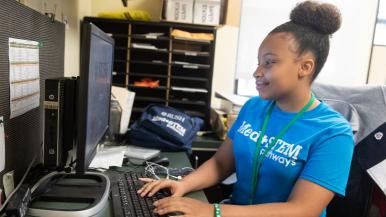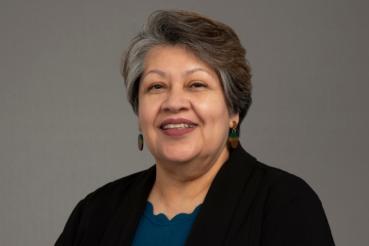Kyla McDaniel always dreamed of going to college to study medicine, but almost lost her nerve in her senior year of high school. She worried about the work, stressed about how to talk to professors and questioned whether she would succeed once she got there. She began to second-guess her future and found herself paralyzed.
Luckily, her godmother — and mentor — was there to help. She provided Kyla with resources and information about the top schools, reviewed her essays and applications, and helped to build her confidence. By time she applied and was accepted, Kyla was ready. She went on to become the first in her family to earn a college degree.
“I had stage fright, but for life,” Kyla said. “She helped me see that I deserve this, and to have the confidence in myself to do what I wanted to do. She held my hand as I went through something very scary. I wouldn't have gone to college without her.”
Kyla, now 23, studied human nutrition and dietetics in college, and today works in human resources at Heartland Health Centers. She also helps teens like her push through their own college anxiety and is a mentor to two Chicago high schoolers exploring futures in medicine through the Rush Education and Career Hub’s (REACH) MedSTEM Pathways program.
“My mentor helped me find scholarships, prepare for college, and overall helped increase my self-confidence,” she said. “It’s an honor and a privilege to provide the same service for my mentees.”
Kyla is one of 20 adult mentors providing individualized one-on-one support to underrepresented teens considering STEM professions through REACH. Driven by a mission to increase postsecondary achievement and diversity in health care and STEM professions, REACH programs are designed to empower Black and Lantinx students from Chicago’s West Side to explore pathways that could lead them to potentially transformative medical careers. Additionally, participants are paired with committed mentors like Kyla for at least a year to serve as a confidant, advisor and steady hand throughout their high school journey.
Research shows that mentoring can have a life-altering impact on young people, particularly those from underserved communities, or who are considered high risk. The 2014 report The Mentoring Effect found that at-risk adolescents with committed mentors tend to set higher educational goals and are 55% more likely to attend college than their peers without mentors. High-risk teens paired with mentors in high school were found to generally maintain a better attitude about school, were 52% less likely than their peers to skip a day and more likely to take on leadership roles, participate in extracurricular activities, and to regularly volunteer in their communities.
COVID-19 has forced Kyla and other REACH mentors to shift their approach, but has also reinforced the ongoing importance of the consistent support and connection they provide. REACH now asks mentors to check in with their mentees virtually at least twice each month and to stay in regular communication over text or email. REACH provides training and tools including sample getting-to-know-you activities, strategies to help develop and build interview skills, and worksheets to guide the development of STAR Goals and individual success timelines. These tools and strategies are designed to help the pairs get to know and connect with one another, to encourage ongoing reflection, celebrate successes, and maintain focus on the student’s long term goals.
For Izabella Zuno, one of Kyla’s two mentees, this blend of support and guidance has been exactly right. Zuno, from Chicago’s West Side, has been involved in REACH programming since fifth grade, and plans to become a psychiatrist. Having a mentor has helped to hold her accountable for setting — and working to achieve — her goals, she said.
“Kyla has taught me how to hold myself accountable,” Izabella said. “This means setting goals and having aspirations but also making sure I truly put in the work it takes to get there every day.”
The success of Rush’s high school program has prompted a call for continued growth of their mentoring model. This year RUSH hopes to double its pool of mentors to 40 and to begin to offer the same level of 1:1 support to participants in their college level programs. Mentors are asked to commit to at least a year to build and sustain their connection, and to be available for their mentees when — or if — they need additional support. See www.reachatrush.org/get-involved for more information, or to apply.
The bond that forms, Kyla said, can benefit the mentor almost as much as the mentee.
“[My mentee] has a persevering spirit that is truly an inspiration for me,” she said. “She reminds me that I should shoot for the stars and never give up on my dreams, even when things get tough. She has truly made me a better person.”




